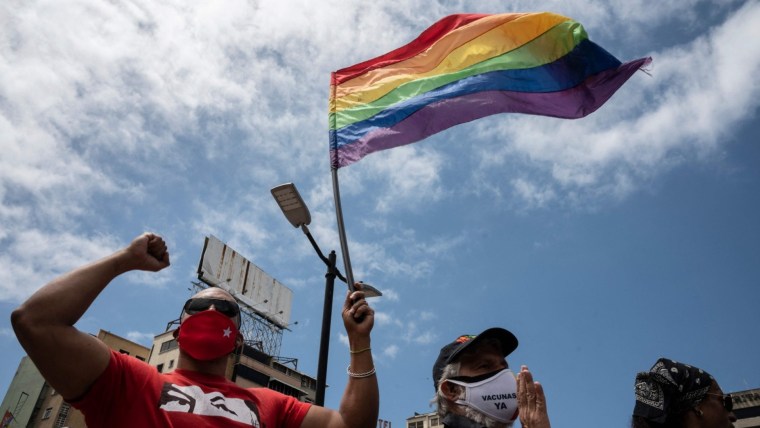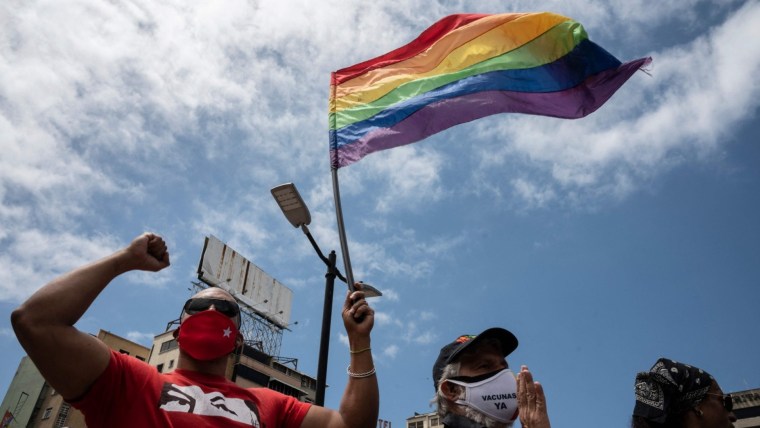
An increasing number of young adults identify as nonheterosexual and noncisgender, according to a new global survey from Ipsos.
The results, released Wednesday, are based on internet surveys of more than 19,000 people in 27 countries ages 16 or 18 (depending on the country) to 74. The surveys were conducted in the languages of each country.
Respondents in Generation Z, which includes people born after 1997, were nearly four times as likely than those over 40 (4 percent compared to 1 percent) to identify as transgender, nonbinary, gender-nonconforming, gender-fluid or “in another way.”
They were also the age group most likely to identify as something other than heterosexual. Overall, 9 percent of respondents identified as lesbian, gay, bisexual, pansexual, omnisexual or asexual; for Generation Z, the figure doubles to 18 percent.
Previous surveys of young Americans have pointed to this phenomenon: In a Gallup poll last year, 5.6 percent of U.S. respondents overall identified as lesbian, gay, bisexual, transgender or queer, while 16 percent of those in Generation Z reported being LGBTQ.
“The patterns that we see in the U.S. are definitely not unique to the U.S.,” Nicolas Boyon, senior vice president of public affairs at Ipsos, said of the higher rate of gender and sexual fluidity among Gen Z. “It’s a global phenomenon.”
Worldwide, 1.4 percent of those surveyed identified as gender minorities, with Sweden (2.9 percent), Germany (2.5 percent) and Argentina (2.3) having the highest percentages of respondents who identify as transgender, nonbinary, gender-nonconforming, gender-fluid or “in another way.” South Africa (0.3 percent) and Belgium (0.5 percent) had the lowest.
India (17 percent), Brazil (15 percent) and Spain (12 percent) had the highest percentages of respondents who identified as nonheterosexual. China and South Korea had the lowest.
Exposure to sexual and gender minorities
Worldwide, 42 percent of survey respondents said they have a gay or lesbian relative, friend or colleague, while 24 percent said they know someone who is bisexual; 10 percent said they known someone who is transgender, and 9 percent said they know someone who is nonbinary, gender-nonconforming or gender-fluid. The likelihood is higher among women than among men in all four groups, and there is wide national variation. In Brazil, for example, 66 percent report having a gay or lesbian relative, friend or colleague, but in Japan and South Korea, the number is only 7 percent.
When it comes to speaking out on behalf of LGBTQ people, nearly one-third of all respondents around the world said they had done so. Consistent with the other findings, the survey found that Gen Z is much more outspoken than older generations, with 40 percent saying they have spoken out against anti-LGBTQ prejudice.
Eleven percent of respondents across all 27 countries reported having attended a same-sex wedding, from over 20 percent in Mexico and Argentina to 1 percent in Russia.
The survey asked about participation in pro-LGBTQ events, like Pride marches. Globally, 13 percent of all respondents said they had attended such an event, including 54 percent of lesbian and gay respondents and 10 percent of heterosexuals. In Australia, more than 20 percent of respondents reported having attended an event in support of LGBTQ rights, but in Russia, only 1 percent did.
“I’m not surprised that Russia stands out,” said Emil Edenborg, an associate senior lecturer at Stockholm University and an expert on Russia. Edenborg, who was not involved in the survey, said the low level of participation in Pride events in Russia is due, in part, to the country’s so-called gay propaganda law.
“Pride parades are banned in Russia since 2013, as are public expressions in favor of LGBT rights,” he said.
The law not only affects activists, Edenborg said — it also targets social media and any kind of public information, including sexual education information.
“The most harmful effect of this law is the way it impacts young people,” he said. “It really has put a harsh form of censuring on young people, especially limiting their ability to speak out about their sexuality and gender identity.”
Same-sex marriage and parenting
The survey found that a global majority are in favor of same-sex marriage. In only two of the 27 countries surveyed, Russia and Malaysia, researchers found majorities in opposition.
Edenborg said same-sex marriage has become a political flashpoint in Russia.
“Same-sex marriage and parenting have been the main features of the homophobic and stigmatizing discourse of the state. Those issues have been highlighted as the biggest threats,” he said.
Worldwide, women are more likely to support same-sex marriage than men. One’s level of education did not play a role in attitudes. Since Ipsos’ last global survey of opinions on same-sex marriage, in 2013, there has not been a drop in support in any country. There was growth in support in most countries, with the U.S. having the second-highest growth, following Argentina, where support grew by 25 percent.
Latin American countries demonstrated relatively high levels of support for same-sex marriage, with 82 percent of respondents in Chile and 76 percent in Mexico in favor of same-sex marriage or some type of legal recognition of gay unions. Jordi Díez, a professor of political science at the University of Guelph, in Ontario, said it is a common misconception that Latin America is uniformly conservative.
“You have much higher levels of tolerance in Latin America than in the U.S. There is no question about that,” he said.
He also pointed to the long history of gay and lesbian activism in Latin America. “Gay and lesbian mobilization in Latin America is actually quite old. The visibility has been there, and these demands have been there for a long time,” he said.
Several Latin American countries — Argentina, Brazil, Colombia, Ecuador, Uruguay and Costa Rica — have adopted same-sex marriage laws. The laws, Díez said, have a “normalizing effect,” increasing support for the policies and acceptance of homosexuality.
Support for equal parental rights is also high worldwide, with 61 percent of respondents saying same-sex couples should have the same rights as heterosexual couples. In only four countries — Russia, Malaysia, Poland and Peru — were there majorities in opposition to adoption by same-sex couples.
Overall, the survey found that women are more supportive of parental rights for same-sex couples and that boomers are more likely to support adoption rights than Gen X. Canada and the Netherlands stand out as having the most support for the parental rights of same-sex couples, with 81 percent of Canadians and 83 percent of Dutch in favor of equal rights for same-sex parents.
Visibility and equality
Around the world, a majority support lesbians’, gays’ and bisexuals’ being open about their sexual orientation (51 percent in favor compared to 16 percent in opposition). There is strong support for laws banning discrimination at 55 percent worldwide, but support is more muted on public affection, with 37 percent supporting and 27 percent opposing.
There is also global support for openly lesbian, gay and bisexual athletes on sports teams. In the U.S., 53 percent of respondents support athletes’ being out, similar to the global average of 50 percent.
The same level of support does not appear to exist for transgender athletes’ competing in accordance with their gender identities. On average across the 27 countries, as many respondents support as oppose the idea (32 percent compared to 32 percent).
“The U.S. is one of the countries where there is the most opposition,” said Boyon of Ipsos, with only 27 percent of U.S. respondents in support.
In the U.S., state legislators have introduced a slew of bills this year to prohibit transgender athletes from competing in school sports.
Obstacles and next steps for a global survey
Boyon acknowledged that global surveys have their limitations. In particular, he cited the difficulty in crafting a survey to adequately capture the diversity of people’s gender identifications.
“In designing the questionnaires, we realized that no matter what we do, we will miss people,” Boyon said. “We are aware of the challenges of using labels.”
Another issue is translation, Boyon said. “We did not use the word ‘queer’ in the survey, because it doesn’t really translate in a lot of languages.”
Relatedly, the survey was designed in English by researchers based in the U.S. and the U.K. “This is a survey that is designed by Westerners,” Boyon said.
The survey does not claim to be nationally representative in all counties. In countries where the internet is not as accessible, for example, the survey captures the opinions of a relatively urban and digitally connected group.
Boyon said that going forward, he’d like to explore whether Generation Z retains its gender and sexual openness.
“One big question about the trends that we see among younger people is whether the patterns we see in Gen Z will stick over time,” Boyon said, “or whether it just reflects youth and as time goes by they may have more defined identities.”
